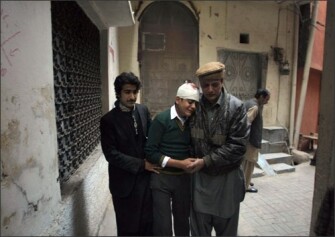
Taliban militants attacked a military-run school in Peshawar, Pakistan Tuesday, killing more than 130 children and 10 staff members and wounding many others in an assault that Pakistani military officials declared over more than eight hours after it began.
According to NBC News:
At a hospital near the school, blood stained the floors. Crying relatives roamed the wards and searched operating rooms, desperately searching for their sons and daughters. The Pakistani Taliban have claimed responsibility for the attack, which Pakistani officials said appeared to be aimed at the children of senior military personnel. Uniformed militants struck shortly before 11 a.m. local time (1 a.m. ET) when about 500 students—in grades one through 10—and teachers were believed to be inside."
The attackers planted bombs, which slowed down efforts to stop the siege, NBC reports. Stories include gruesome details of teachers lit on fire in front of their students and children being chased through hallways by attackers. Here’s a video showing some of the chaos in the attacks’ aftermath.
Nobel laureate and child education advocate Malala Yousafzai said she was “heartbroken” by the attack. “Innocent children in their school have no place in horror such as this,” Yousafzai said, according to the Washington Post.
President Obama released this statement:
The United States condemns in the strongest possible terms today's horrific attack on the Army Public School in Peshawar, Pakistan. Our hearts and prayers go out to the victims, their families, and loved ones. By targeting students and teachers in this heinous attack, terrorists have once again shown their depravity. We stand with the people of Pakistan, and reiterate the commitment of the United States to support the Government of Pakistan in its efforts to combat terrorism and extremism and to promote peace and stability in the region."
“Getting an education is every child’s right,” United Nations Secretary-General Ban Ki-moon said of the attack. “Going to school should not have to be an act of bravery.”
A Different Motive and Scope
The attack in Pakistan was obviously very different from school violence in the United States, both in scope and motive. The largest K-12 attack in U.S. history is the December 2012 shootings in Newtown, Conn., in which 27 people died, including the gunman. And the motive for U.S. school attacks is usually associated with mental illness or suicidal urges, not terrorism as it appears to be in this instance. From USA Today:
Taliban spokesman Mohammed Khurasani claimed responsibility for the attack in a phone call to news media, saying six suicide bombers carried out the attack in revenge for the killings of Taliban members by Pakistani authorities. Tehreek-e-Taliban is a Pakistani militant group pressing to overthrow the government. Pakistani army Gen. Asim Bajwa tweeted that 'several ops' had been launched by Pakistan after the attack, including 10 airstrikes. Pehsawar sits near the border with Afghanistan, the primary base of operations for the Taliban. Peshawar has been the target of frequent militant attacks in recent years—in September 2013 a twin suicide bomb blast in a Peshawar church killed at least 85 people."
International Responses to School Violence
Education Week explored international responses to school violence in 2004 after a 52-hour hostage standoff staged by Chechen militants at a school in southern Russia resulted in the deaths of more than 330 people, about half of them children.
“The horrific incident underscored the vulnerability of schools around the world, where the scope of security varies greatly, school leaders and private consultants say,” Education Week reporter Sean Cavanagh wrote. “It has also prompted administrators to re-evaluate the safeguards on their campuses, a task that has become familiar to them in the wake of terrorist incidents in recent years, some of them affecting students.”
The story noted the broad differences between U.S. states and districts in school safety requirements. That stands in contrast to some other countries’ approaches, but not all of them have the resources for broad security measures. From the 2004 story:
Israel's Ministry of Education assesses the security needs of all the country's schools and works with local police in establishing campus-specific guidelines for how they should be protected, Ido Aharoni, a spokesman for the country's consulate in New York, wrote in an e- mail. In other countries, particularly in the developing world, school security is often hampered by a lack of financial resources. Across broad swaths of Africa, for example, many schools have doors that don't lock and broken windows, said May Rihani, a senior vice president at the Academy for Educational Development, who has worked in many nations on that continent and in the Middle East. In Africa, the chief worry among many school leaders is not armed intruders but the risk that girls will be sexually assaulted heading to or from school, said Ms. Rihani, whose Washington-based organization works to improve education in developing countries."
Photo: The uncle and cousin of injured student Mohammad Baqair, center, comfort him as he mourns the death of his mother, who was a teacher at a school in Peshawar, Pakistan, that was attacked by the Taliban on Tuesday. --Mohammad Sajjad/AP
